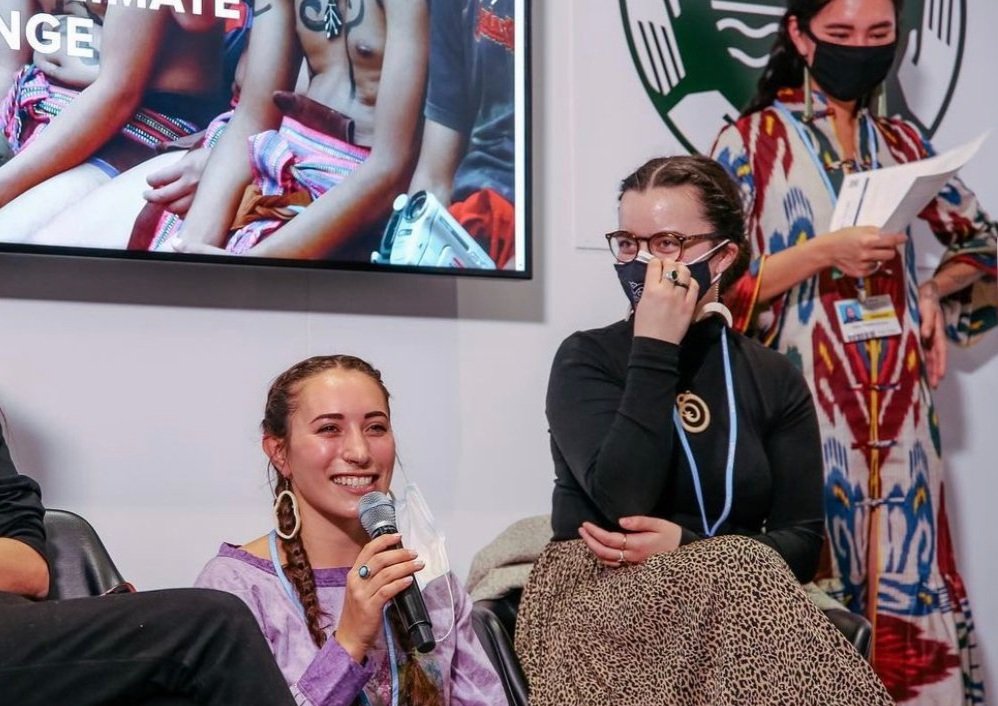
COP29 Programme
View the programme for the COP29 Indigenous Peoples’ Pavilion below
Indigenous Peoples Pavilion
Weekly Programme
For daily programme and details, see below
Week 2 Daily Programme
See events’ details below
Events' details
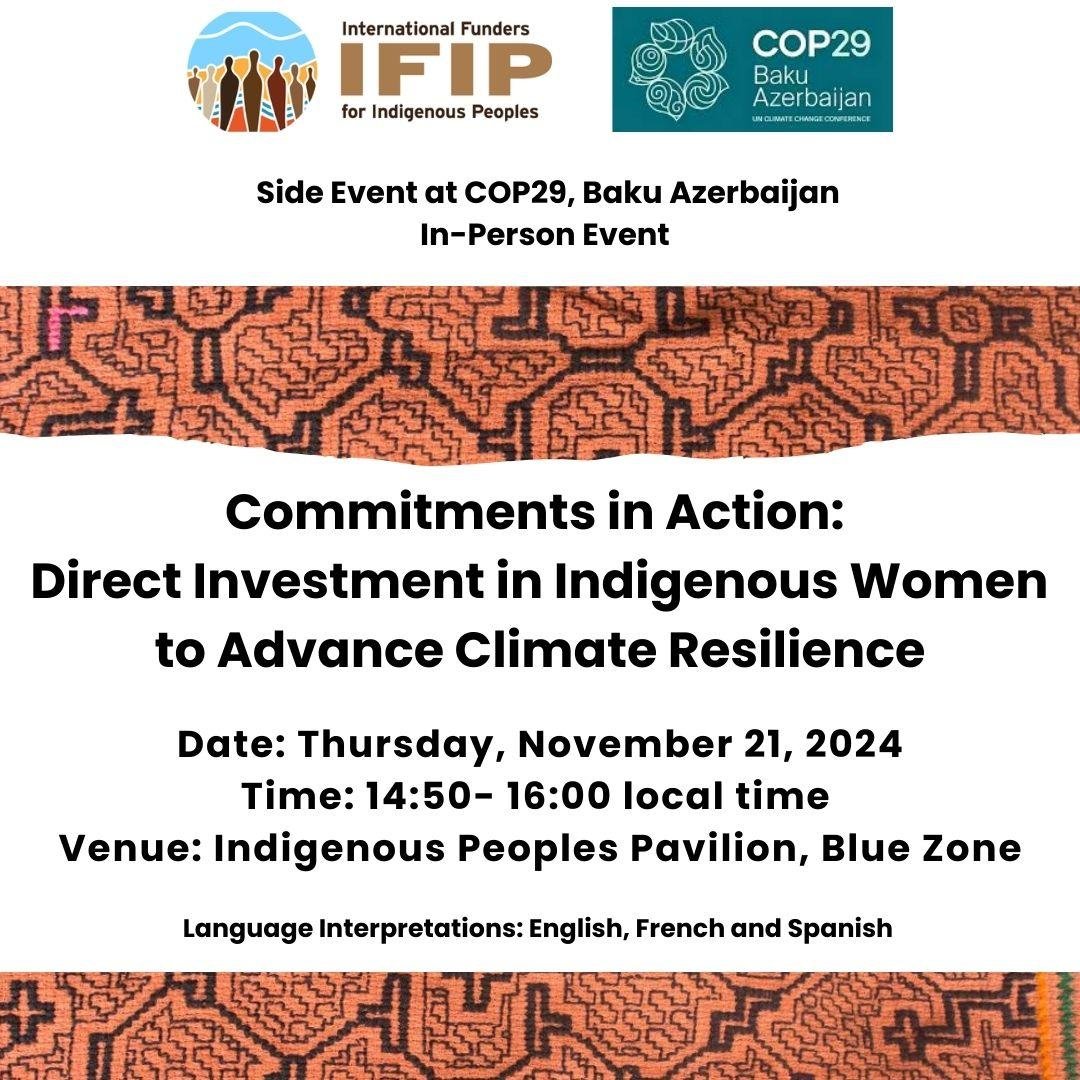
Commitments in Action: Direct Funding to Indigenous Women for Advancing Climate Resilience
Host Organisation
International Funders for Indigenous Peoples (IFIP)
Description
The event will feature an engaging panel discussion with cross-sector representatives of Indigenous Women’s movement, the feminist climate justice advocates, and donor community to amplify the voices for making climate finance directly accessible to Indigenous Women .
Indigenous Women´s leadership in preserving ecosystems, managing natural resources, and implementing climate adaptation strategies is indispensable. Yet, they remain systematically marginalized and excluded from accessing resources. This exclusion results from multiple barriers, including structural inequalities, exclusion from decision-making spaces, and insufficient gender-responsive climate financial instrument. The climate finance mechanisms and climate philanthropy are ridden with complex bureaucracies, limiting the direct access of Indigenous Women. Without direct access to climate finance, Indigenous Women face significant challenges in scaling climate adaptation and mitigation efforts.
The recent study conducted by IFIP and FIMI shows that of the 28.5 Billion philanthropic grants given from 2016-2020 to supporting women and girls, only 392 million (1.4%) was allocated to organizations benefiting Indigenous Women. This evidences an unequal resource distribution towards Indigenous Women. As global climate financial needs continue to grow, there is a crucial need to address these structural barriers and making climate finance flow accessible.
Speakers
Lucy Mulenkei - ED, Indigenous Information Network
Eileen Mairena Cunningham - IPO Focal Point to the UNFCCC
Women and Gender Constituency (WGC) Rep - Women and Gender Constituency
Ursula Miniszewski - Global Greengrants Fund. Director of Gender and Equity
Kate Landon - ED, Ban Ki-moon Foundation
Languages
English, French, Spanish
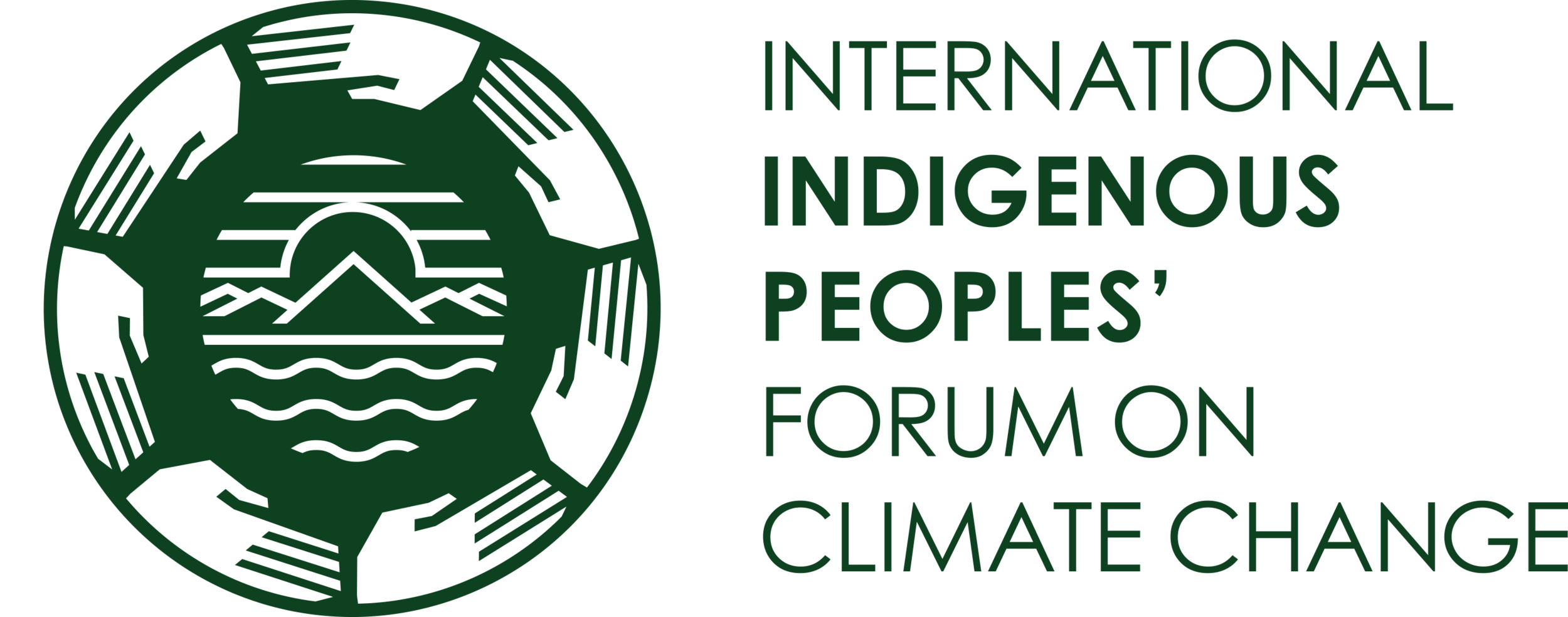
Muy Billi (La abuela Mar) y Nagwana (La Madre Tierra). Diálogo de resistencia desde las sabidurías indígenas
Host Organisation
Memoria Indígena
Description
Está sesión trata sobre como el relato de Muu Billi, Nabgwana y otros relatos indígenas nos muestran propuestas de esperanza y reexistencia en los sistemas politicos y sociales para la lucha contra el cambio climático y la biodiversidad. Cómo desde una relectura de estos relatos en la actualidad nos ayuda a discernir desde la sabiduría y epistemología indígenas propuestas de cuidado y de defensa de los territorios y la tierra
Speakers
Jocabed R Solano Miselis, Sara Omi, Valjakka Mari y otras
Languages
Spanish, English

Empowering Maasai Women in Climate Action through Protecting Grazing Lands and Promoting Gender Equality
Host Organisation
KINNAPA DEVELOPMENT PROGRAMME
Description
This event will focus on the critical role Maasai women in Tanzania play in addressing climate change, particularly through their efforts in protecting communal grazing lands and advocating for gender equality in land governance. Pastoralist communities, like the indigenous Maasai, are among the most vulnerable to the impacts of climate change due to their reliance on natural resources and traditional livelihoods. However, Maasai women have emerged as key actors in ensuring the sustainable management of these resources, promoting climate resilience, and challenging gender inequalities in land rights.
The session will showcase the grassroots efforts of Maasai women from the Kiteto District in advocating for land rights and climate adaptation, as well as their success in reporting gender-based violence and addressing land injustice issues through platforms like the ALOLLE and OLENGAPA Women’s Forum. Panelists will also discuss the intersection of indigenous knowledge, gender equality, and climate justice, exploring how inclusive land governance policies can strengthen community resilience.
This session will be particularly relevant to indigenous peoples, policymakers, climate activists, and organizations focused on promoting sustainable development, as it provides insights into indigenous-led climate solutions and the empowerment of marginalized groups, particularly women.

Lanzamiento de la Conmemoración 100 años de la Revolución Guna
Host Organisation
Comisión de Centenario de la Revolución Guna

Juventudes indígenas latinoamericanas: realidades y propuestas en la COP29
Host Organisation
Latin American Youth Climate Scholarship
Description
En este evento, exploraremos las perspectivas y propuestas de las juventudes indígenas de América Latina en el contexto de la COP29. Los jóvenes indígenas están en la primera línea de la lucha contra el cambio climático y la preservación de sus territorios. A través de sus experiencias y propuestas innovadoras, buscan destacar los desafíos específicos que enfrentan y ofrecer soluciones basadas en sus conocimientos tradicionales y visiones para un futuro sostenible.
Este encuentro contará con la participación de jóvenes líderes indígenas que compartirán sus historias, desafíos y las propuestas concretas que llevarán a la COP29. La discusión se centrará en cómo estas propuestas pueden influir en las políticas internacionales y en la forma en que se abordan las crisis ambientales y sociales en sus comunidades.
Speakers
Adela Esther Tuy Tuy (19), Guatemala: es una joven indígena Maya Kaqchikel de Sololá, Guatemala. Como embajadora de Girl Rising y miembro del Consejo de Niñas en She's The First, trabaja en la promoción de la participación juvenil. Fundó el colectivo "Up&Up" para jóvenes mujeres indígenas y forma parte de la red Ajk’at Iximulew, enfocada en temas ambientales y el Acu n erdo de Escazú. Ha moderado el programa "Tzijonem" y participa en podcasts para abordar problemáticas sociales desde la perspectiva juvenil. Estudia Ciencias de la Comunicación Social y aspira a ser escritora.
Betzabeth Martínez Gutiérrez (24), México: es una joven indígena zapoteca de Santiago Matatlán, Oaxaca, conocida por su trabajo en la preservación ambiental y el empoderamiento de mujeres indígenas. Licenciada en Contaduría por la UNAM, ha liderado iniciativas como la siembra de árboles y la recolección de residuos. Su compromiso con los derechos humanos y las lenguas maternas la llevó a recibir el Premio Estatal de la Juventud en 2019. También ha sido becaria de la Embajada de Estados Unidos en México y actualmente colabora en proyectos ambientales enfocados en su comunidad y la industria del mezcal.
Rayane da Silva França (22), Brasil: conocida como Yawadj Xipai, es una joven indígena de Altamira, Brasil. A sus 22 años, cursa Relaciones Internacionales en la Universidad Federal de Santa Maria, siendo la primera mujer indígena en su campo. Se especializa en temas climáticos, derecho internacional, género y raza, con el objetivo de abrir espacios para otros jóvenes indígenas y promover el acceso a estas áreas de estudio.
Languages
English, Portuguese, Spanish

DEADLIEST: The dangers faced by Indigenous Peoples and Environment Defenders in Philippines and Asia
Host Organisation
Indigenous Peoples Movement for Self-Determination and Liberation (IPMSDL)
Description
For 12 years now, the Philippines remains the most dangerous country in Asia for land and environmental defenders including mostly Indigenous Peoples. This comes second to the killings in the South American region.
The panel discussion will have Indigenous Peoples speakers from the Philippines, other countries in Asia, and an expert resource person from Global Witness.
It seeks to go beyond the numbers. The discussion will give face to how the danger looks in the everyday life of Indigenous Peoples with the aim of highlighting:
the climate solutions of Indigenous Peoples like safeguarding their ancestral lands and natural resources which are erasers due to the threats from corporations, state actors, and illegal operations
the trends and analysis on these attacks to make sense of these killings in the whole discussion of climate crisis
the actions, struggles and victories undertaken by Indigenous Peoples to defend their right to self-determination, push back from the attacks and demand accountability and justice
why the agenda of Indigenous Peoples and environmental defenders must be included in all climate and environment international, negotiations
This conversation is crucial to amplify the voices of the marginalized and to galvanize local, regional, and international support to end violence and ensure the survival of both environmental protectors and the ecosystems they defend.
Format/ Program:
5 mins - Opening video and introduction
15 mins - Philippines sharing
5 mins - Burma sharing
5 mins - Indonesia sharing
5 mins - Global Witness
20 mins - Question
5 mins - Closing and solidarity commitments"
Speakers
Facilitator:
Nedlloyd Tuguinay, Asia Young Indigenous Peoples Network (AYIPN) & Asia Indigenous Youth Platform (AIYP)
Speakers:
Sarah “Bestang” Dekdeken, Cordillera Peoples Alliance (CPA) & IPMSDL
Lerma Lawian, Save Our Schools Network (SOS)
Pirawan Wongnithisathaporn, Asia Indigenous Peoples Pact (AIPP)
Paul Sein Twa, Karen Environmental and Social Action Networkaren (KESAN)
Monica Ndoen, Aliansi Masyarakat Adat Nusantara (AMAN)
Gabriella Bianchini, Land and Environmental Defenders Senior Campaigner, Global Witness
Languages
English

Making the Fund for responding to Loss and Damage (FLD) a Human Rights Based Finance Mechanism
Host Organisation
Tebtebba
Description
This session will convene 4-5 Indigenous leaders to explore the operationalization of a human rights-based Loss and Damage fund. The discussion will focus on key human rights issues that Fund for Responding to Loss and Damage Fund (FLD) and its Board are currently grappling to address, including:
1. Direct Access for Indigenous Peoples: What does direct access mean from the perspective of Indigenous Peoples? What mechanisms can be implemented to ensure direct access within the framework of the Fund, particularly as it operates under the World Bank financial intermediary fund?
2. Scope and Support for Indigenous Peoples: What are the activities of the Fund should be prioritized to effectively address the loss and damage experienced by Indigenous Peoples, including both economic and non-economic loss and damage? What specific activities should the Fund support to be most responsive to these needs?
3. Safeguards, Standards, and Policies: What safeguards, standards, and policies are necessary to ensure that the Fund is inclusive and sensitive to human rights concerns?
The insights gathered from this session will inform the ongoing engagement of the Indigenous Peoples with the Fund for Responding to Loss and Damage and its Board.
Speakers
TBD
Languages
English

Generations of Change: Indigenous Women and Youth Shaping Climate Solutions
Host Organisation
Global Alliance of Territorial Communities
Description
This event will focus on the intergenerational collaboration between Indigenous women and youth in addressing the climate crisis. It will explore how their shared traditional knowledge, resilience, and innovative approaches can lead to transformative solutions. The event aims to emphasize the importance of uniting traditional wisdom with advocacy, and innovations such as new technologies, empowering Indigenous youth to build on the legacy of their elders while forging new paths in the global climate movement.
Speakers
Sara Omi(AMPB), Aissatou Oumarou (REPALEAC), Saira Marleine (REPALEAC), Joao Pankararu (APIB) - All GATC
Languages
Spanish, French, English

Amélioration de la résilience des femmes autochtones Batwa du Burundi, aux effets du changement climatique et l'accès aux droits humains à travers l'agroforesterie et la reforestation communautaire.
Host Organisation
UNISSONS-NOUS POUR LA PROMOTION DES BATWA (UNIPROBA)
Description
Notre événement portera sur les activités que notre organisation UNIPROBA est en train de mener en faveurs des femmes autochtones Batwa en réponse aux effets du changement climatique, des activités relative à la protection de l'environnement et la plantation des arbres autochtones, forestiers et agro-fruitiers dans les propriétés de la communauté autochtone mais aussi dans d'autres espaces notamment les collines et les espaces riverains des rivières.
Speakers
1. Equipe de l'UNIPROBA (qui animera l'événement)
2. Groupe des autochtones de l'International Land Coalition (ILC-AFRIQUE)
3. Réseau des Populations Autochtones et Locale pour la gestion durable des Écosystèmes forestiers d'Afrique Centrale (REPALEAC)
4. Représentant de l'ACORD-BURUNDI
Languages
French, English
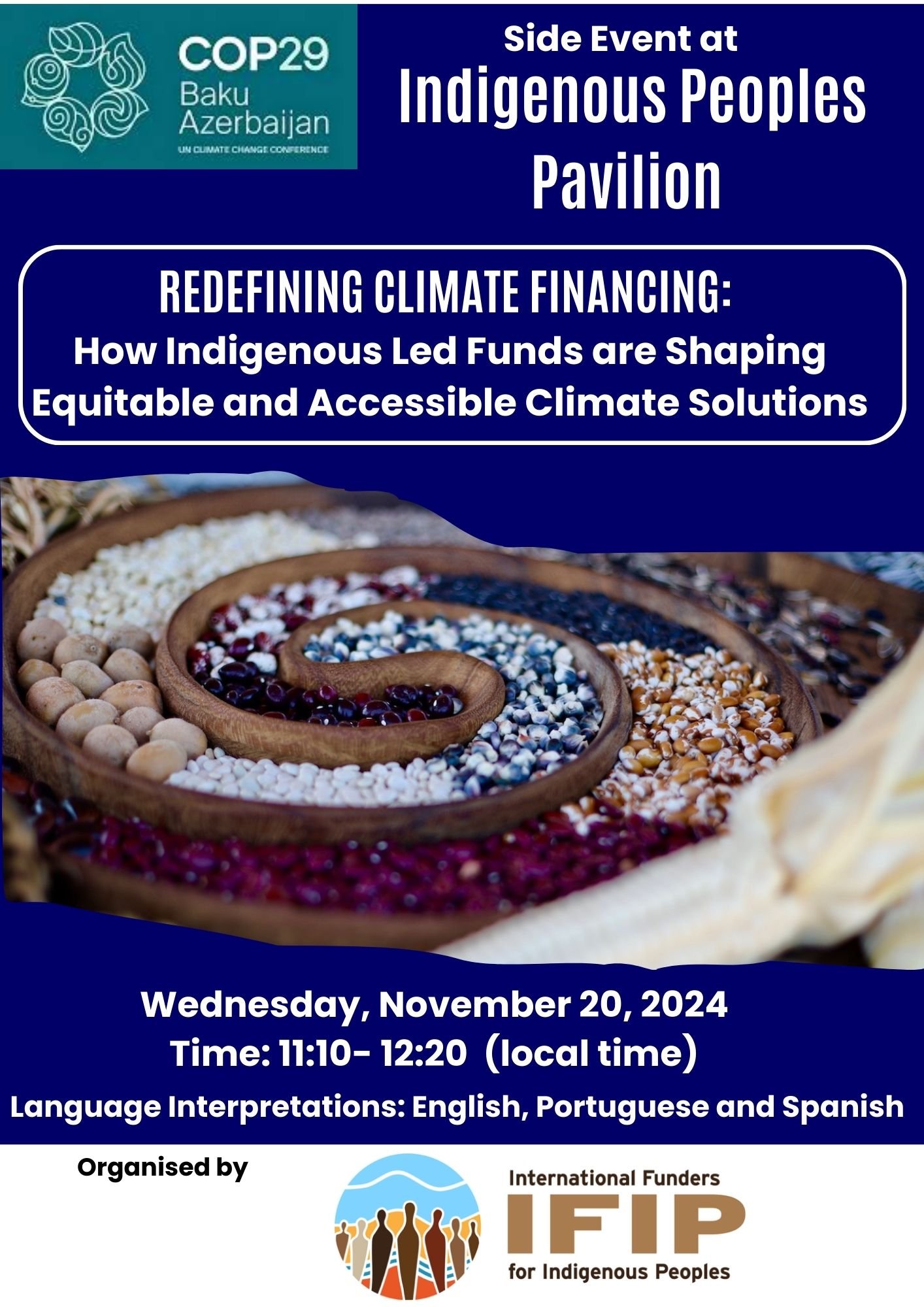
Redefining Climate Financing: How Indigenous Led Funds are shaping equitable and accessible climate solutions
Host Organisation
International Funders for Indigenous Peoples (IFIP)
Description
The event will be an engaging panel discussion with representatives of Indigenous Peoples Led Funds to shed light on the critical role Indigenous Led Funds are playing in reshaping the traditional climate financing by making it accessible to the Indigenous Peoples.
Indigenous Peoples are frequently praised and sympathized with for being stewards of nearly 80% of the world's biodiversity, yet their significant climate finance needs remain largely unmet. It wasn't until COP26 that donors established a dedicated funding mechanism for Indigenous Peoples. However, research shows that only 7% of the promised $1.7 billion has actually reached Indigenous Peoples and local communities (IPLCs). In contrast, the UNFCCC estimates the climate finance needs of developing countries at $5.9 trillion. With the majority of Indigenous Peoples residing in middle-income countries, their specific climate finance needs are estimated to be in the hundreds of billions.
As COP29 sets a new climate finance goal, we urge the donor community to engage with Indigenous-led funds that are transforming traditional funding practices to better meet the needs of Indigenous Peoples. Alongside bilateral, multilateral, and UNFCCC mechanisms, philanthropic contributions are a major source of climate funding. Thus, we urge the philanthropic communities to take a leading role in shaping the new climate finance goals and delivery mechanisms.
Specific Objective of the session:
1. Facilitate a dialogue on the values and strategies of Indigenous-led funds in advancing climate action for Indigenous Peoples and their communities?
2. Explore how emerging climate finance goals can be aligned to effectively and strategically align to address the specific the needs and priorities of Indigenous Peoples?
3. Identify actionable pathways to mobilize resources, both within and beyond the donor community, for climate action initiatives centered on Indigenous leadership and participation.
Speakers
Mali Ole Kaunga - Director, Kipok Fund
Valeria Paye - Executive Director, Podaali Fund
Jenifer Lasimbang - ED, Indigenous Peoples of Asia Solidarity Fund
Myrna Cunningham - Chair, Pawanka Fund
Languages
English, Spanish

How Asia’s Indigenous Peoples, LCs, and CSOs strengthened voices and capacity support effective local to global climate & biodiversity solutions
Host Organisation
Non Timber Forest Products Exchange Programme Asia
Description
The event will present the Bangkoeunphal Declaration, developed by Indigenous Peoples, local communities and civil society organizations in ASEAN with support from the Mekong Region Land Governance, Wyss Academy for Nature, and Green Livelihoods Alliance will be presented.
Indigenous Peoples, LC, and CSO speakers will also share their experiences, challenges, and recommendations, including transformative approaches (e.g., genuine inclusion, and the importance of equitable and meaningful participation) in practice and policy in order to achieve real and effective climate and biodiversity solutions at the local, regional and global level.
Speakers
Indigenous Peoples, local community, and Civil Society Organization representatives of the CSO Forum on Social Forestry in ASEAN, Green Livelihoods Alliance, Asia Indigenous Peoples Pact, Women in Action on Mining in Asia, , and ICCA Consortium Southeast Asia, and Asian Farmers Association from the Philippines, Thailand, Vietnam, Malaysia, Indonesia, Cambodia, and Myanmar will participate. Gender balance among resource speakers will be observed.
Languages
English

Indigenous Leadership in Advocating for the Rights of Nature
Host Organisation
The Indigenous Council for the Global Alliance for the Rights of Nature and the Women's Earth and Climate Action Network (WECAN)
Description
During this event, members of the Indigenous Council for the Global Alliance for the Rights of Nature (GARN) will explore the deep connection between the Rights of Nature and Indigenous sovereignty. Grounded in the Indigenous cosmovision, which sees Nature as a living entity with inherent rights, this event will highlight the importance of centering Indigenous knowledge and leadership in global environmental governance, and how Rights of Nature can support ongoing efforts for Indigenous sovereignty and climate action. Panelists will discuss the critical role of Indigenous peoples in shaping international policy dialogues at COP29 and COP30, and how we can build pathways towards real change that honors both our natural world and the rights of those who have safeguarded it for generations.
Speakers
The event will be led by Casey Camp-Horinek (Ponca Nation), Environmental Ambassador for the Ponca Nation, and Board Member and Project Coordinator for the Women's Earth and Climate Action Network (WECAN) and chair of the Indigenous Council for the Global Alliance for the Rights of Nature (GARN) with additional Indigenous Rights of Nature speakers TBD.
Languages
English, Spanish

Indigenous Content in the Sixth IPCC Assessment Report and its Present and Future Implications to Indigenous Peoples Globally
Host Organisation
University of British Columbia - Vancouver, BC
Description
This session will share findings from a three-year study of the Indigenous content in the Sixth IPCC Assessment Report (AR6) conducted by the Knowledge Justice Collective. The speakers will discuss the overall inclusion of Indigenous content in the IPCC processes with a special focus on the latest report, followed by specific recommendations for the Seventh Assessment Report (AR7) and beyond. The collective is a group of Indigenous and non-Indigenous scholars based in different parts of the world that seeks to respectfully advance meaningful engagements across knowledge systems. This begins with the recognition of epistemological value of Indigenous Knowledges in solving world problems.
Speakers
Pasang Yangjee Sherpa, University of British Columbia, Human Dimensions of Climate Change
Ritodhi Chakraborty, Lincoln University, Political Ecologist
Pasang Dolma Sherpa, Center for Indigenous Peoples' Research, Education, and Development (CIPRED), Indigenous Peoples and Climate Change
Kristyn Ostanek, UN Foundation, Marine Ecologist (Knowledge Justice Collective)
Languages
English

Climate Change Impacts for Persons with Disabilities and Indigenous Peoples with Disabilities and some eforts Peoples with Disabilities and some incitatives on the ground
Host Organisation
National Indigenous Disabed Women Assocation Nepal
Description
It will be side events with list of relevant speakers to higlight on the issues.
Speakers
Pratima Gurung, NIDWAN, Menuka ARROW, Lakpa Sherpa AIPP, Pasang Sherpa, IPs constituencies
Languages
English

Transición energética en el desierto de Atacama y la crisis hídrica
Host Organisation
Turismo indígena Atacameño - Lickanantay
Description
Mostrar una PPT y video del territorio y los daños ecosistémicos en el salar de Atacama
Speakers
Claudia Cabezas, Rosa Ramos Y Camila Martinez
Languages
Spanish

Connections that Matter
Host Organisation
High Seas Alliance
Description
Small Island Developing States (SIDS) are custodians of a wealth of Indigenous and traditional knowledge, which could complement scientific understanding and assist with policy formulation that is suited for local realities. Science, technology, Indigenous and traditional knowledge are critical to ensure that SIDS have the required capacity to conserve and sustainably use marine biodiversity in areas within and beyond national jurisdiction.
The UN Decade of Ocean Science for Sustainable Development (2021-2030) emphasizes the importance of highlighting knowledge-to-policy to better codesign sustainability strategies and incorporating the needs and interests of Indigenous Peoples, and of local communities.
Acknowledging the crucial contribution of Indigenous Peoples, and of local communities, this session will include dialogue between representatives of knowledge holders, scientists, and policymakers to highlight synergies and collaboration
Speakers
TBC
Languages
English
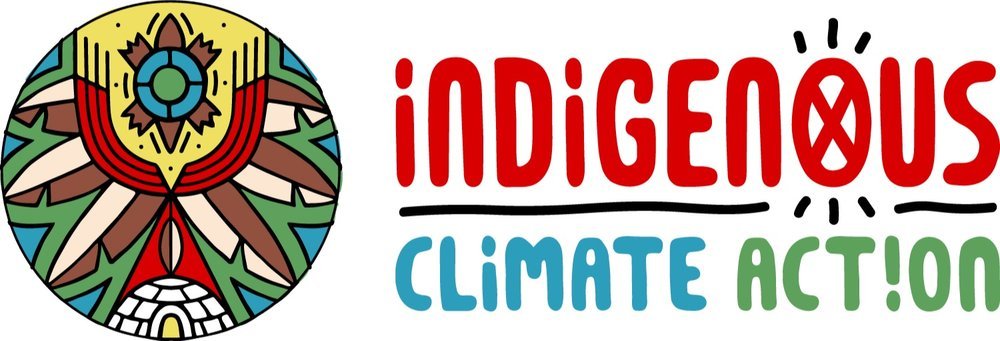
Catalyzing Change: Unveiling the “Land Back IS Climate Policy” Report
Host Organisation
Indigenous Climate Action
Description
To address climate change and climate justice, it is essential that policies and solutions target the persistent drivers and underlying causes of the crisis. To follow up Indigenous Climate Action’s (ICA) panel event last year, ICA is back to release the final part of the Decolonizing Climate Policy Project: Phase 2. Join this panel that will feature the release of “Land Back is Climate Policy”, which dives into youth leadership, climate policy and Indigenous knowledge. This event will nurture a deeper understanding of how “Land Back” can fundamentally reshape climate policy. The panel will feature the following key themes:
- Youth Perspectives: hear directly from Indigenous youth that are leading climate action initiatives
- Indigenous-led Climate Policy: engage in discussions about how climate policies can be reimagined through Indigenous worldviews and governance systems
- Actionable Pathways: discover six pathways and ten categories of solutions that Indigenous people in so-called Canada are enacting right now
Speakers
Moderator - Jayce Chiblow, Indigenous Climate Action
Speakers:
Eriel Deranger, Indigenous Climate Action
Alexa Metallic, Indigenous Climate Action
To be determined.
Languages
English

Les femmes et filles du Sahel (Burkina Faso, Mali, Niger) dans l'action climatique
Host Organisation
Tinhinan/Collectif Féministe du Burkina
Description
Présentation des articles fabriquer par nos femmes autochtones
Speakers
Tinhinan/Collectif Féministe du Burkina
Languages
French, English

Indigenous Economies: Entrepreneurship that Preserves Nature
Host Organisation
Global Alliance of Territorial Communities
Description
This panel will explore how Indigenous-led entrepreneurship offers innovative pathways for sustainable economic development while preserving the natural environment. By blending traditional knowledge with modern business practices, Indigenous communities are not only creating resilient economies but also safeguarding biodiversity and ecosystems. Through real-world examples, Indigenous entrepreneurs and leaders will showcase how their businesses align with cultural values, protect natural resources, and contribute to climate solutions. This discussion will highlight the vital role of Indigenous economic models in fostering sustainability and resilience, benefitting both local communities and the global environment.
Speakers
Juan Carlos Jintiach, Shuar Peoples, Ecuadorian Amazon
Sara Omi, Embera Peoples of Panama
James Lloyd, Nature4Climate
Monica Ndoen, Indigenous Peoples Alliance of the Archipelago
Languages
English, Spanish

Direct access to climate funds: Impact of IPs and LCs on climate action through the DGM and other initiatives.
Host Organisation
Conservation International / DGM Global Project
Description
After 9 years of implementation of the Dedicated Grant Mechanism for Indigenous Peoples and Local Communities DGM led by indigenous peoples and local communities in 12 countries in Asia, Africa and Latin America, this session seeks to present the main outcomes of this project that contribute to climate action. It also seeks to reflect on the DGM model regarding the direct access of indigenous peoples and local communities to climate financial resources.
Speakers
Facilitador: Johnson Cerda. Speakers: Mousele Diseka/DRC, Juanita Sisimit/Guatemala, Thakur Bhandari/Nepal, Lucely Pio/Brazil, World Bank rep and CIF rep.
Languages
English, Spanish, French

Kawthoolei Nationally Determined Contribution: Indigenous Karen Forest Conservation and Climate Action Plan in Burma/Myanmar
Host Organisation
Kawthoolei Environmental Protection Committee (KEPC)
Description
Myanmar’s first Nationally Determined Contribution (NDC) was submitted to UNFCCC in July 2021. Most of the targets and actions included in that NDC were set at a national-level, without inclusive or detailed consultations with local or sub-national-level stakeholders. This meant that Indigenous Peoples and local communities (IPs & LCs) across the country were missed from the process. This exclusion of local-level stakeholders and their important role in delivering on the Paris Agreement – both in Myanmar and across the world – became the centre of discussions at the United Nations climate conferences in Glasgow (COP26), Egypt (COP27) and Dubai (COP28). At these events, representatives from Myanmar’s civil society and indigenous groups clearly expressed the need for sub-national climate targets and actions to ensure the effective participation of non-state actors in climate change mitigation and adaptation.
Affirming the critical participation of non-state actors (often IPs & LCs) is more critical than ever in Myanmar at this time. National action on Myanmar’s NDC is currently at a standstill due to the complex political situation in the country. However, through a process facilitated by representatives from the Karen, an ethnic majority in southern Myanmar, and alongside other Indigenous Peoples, a localised climate action plan has been developed. The plan demonstrates the determination and commitment of Indigenous Peoples to take climate change action, while recognising their territories and traditional way of life. Initial formation of this climate action plan began in October 2022, and has been further developed over the course of capacity building sessions, workshops and consultations. Various stakeholders have been involved in the development process, including local civil society and community-based organisations from southern Myanmar.
Speakers
Saw Frankie and Saw Ah Oo
Languages
English

Forests and Rangelands as Lifelines: Indigenous Stewardship for Forest and Rangeland Conservation and the Need for Financial Support
Host Organisation
International Alliance of Indigenous and Tribal Peoples of the Tropical Forests
Description
This side event highlights the critical role Indigenous Peoples play in preserving the world’s forests, rangelands and mitigating climate change. Indigenous communities, who manage vast forests have used traditional knowledge and sustainable practices to protect these ecosystems for generations. Their deep understanding of rangeland and forest management has resulted in lower deforestation rates and thriving biodiversity in Indigenous-managed lands. Despite this, these communities face increasing threats from deforestation, land grabs, and industrial exploitation, often without adequate legal recognition or financial support.
This event will emphasize the urgent need for greater financial investment in Indigenous-led conservation efforts. Indigenous leaders will present case studies illustrating the effectiveness of their forest stewardship, while advocating for direct access to climate and conservation finance mechanisms. Financial support, alongside the recognition of Indigenous land rights, is essential to empower these communities to continue their vital work in forest conservation, climate mitigation, and biodiversity protection
Speakers
Moderator- Edna Kaptoyo- Pawanka Fund
Speakers:
Aminatu Samiratu Gambo- Indigenous Women Biodiversity Network
Angela Sanau Paswa-MMWCA
Ramson Karmushu- MIKIA
Mary Sintoyia- Nyekweri Kimintet Community Forest Conservation trust
Daniel Mabengo- DRC
Languages
English, French, Spanish

Intercambio de experiencias y buenas prácticas en la implementación de mecanismos de facilitación de recursos a organizaciones indígenas
Host Organisation
Foro Internacional de Mujeres Indigenas-FIMI
Description
Experiencias sobre financiamiento directo a organizaciones de Mujeres Indígenas que luchan por la justicia climática.
Speakers
Tarcila Rivera, FIMI/ECMIA/CHIRAPAQ
Lourdes Inga
Directora Ejecutiva
IFIP
Noemi Grutter
Coordinadora
Global Alliance for Green and Gender Action (GAGGA)
Languages
English, Spanish

Old Finance with a New Spin: Climate Finance and Impacts on Indigenous Peoples
Host Organisation
Indigenous Environmental Organization
Description
Historically, global financial systems have funded irrevocable harm at extraction sites and caused debt in the Global South. The banks and development institutions that have financed extractive industries targeting Indigenous Peoples' territories in the North and South, are the same institutions that build so-called climate finance. Indigenous Peoples, women and climate impacted communities require finance, but will it be the same old finance that causes harm, violence, and extraction?
This Round Table will discuss the historical legacy of financial institutions and highlight how climate finance at COP 29 fails to address the inequality embedded in these systems.
Speakers
TBA
Languages
English, Portuguese

Indigenous Climate Leadership in so-called Canada: Uplifting the voices of First Nations, Inuit, and Métis leaders
Host Organisation
Metis National Council, Inuit Circumpolar Council, Assembly of First Nations
Description
The Assembly of First Nations (AFN), Inuit Circumpolar Council (ICC) and the Métis National Council (MNC) will be presenting a panel of Indigenous leaders and representatives on Indigenous Climate Leadership in Canada. Announced in 2022 by Canada as part of the 2030 Emissions Reduction Plan, Indigenous Climate Leadership committed Canada to advance distinctions-based mitigation and adaptation climate actions by Indigenous Peoples. By COP 29, the memorandum to cabinet will have been submitted to Canada, and First Nations, Inuit, and Métis will be anticipating long-term investments to advance their self-determined climate solutions. The panel will include representatives from each of the National Indigenous Organizations speaking about the elements of distinctions-based Indigenous Climate Leadership, their expectations for Canada, and the connections to the international arena. It will end with an open question and answer period.
This panel will bring together these diverse perspectives from across Canada to highlight the urgent need of direct climate finance for Indigenous Peoples and to demonstrate how Indigenous Peoples are leading the way in rights-based climate action.
Speakers
Dane DeSouza - Moderator.
Representative of the Métis Nation: Drew Stuart (Senior Manager of Climate Change Policies and Programs)
Representative of the Assembly of First Nations: National Chief Cindy Woodhouse-Nepinak or Marie-Philippe Menard, National Youth Council
Representative of Inuit Circumpolar Council: Adamie Delisle Alaku, Vice President, Makivvik
Languages
English

Direct access to climate financing: How can Indigenous Peoples Organizations and donor/contributors engagement address and overcome the barriers to direct access to funding?
Host Organisation
Conservation International / IPFAF project
Description
"The Indigenous Peoples Finance Access Facility (IPFAF) is a US Department of State-funded initiative to support Indigenous Peoples groups around the world to directly access existing finance mechanisms, supporting their efforts to continue to conserve some of the most critical forests on earth. The overall goal of this project is to enhance Indigenous Peoples capacity to access funding for the conservation, restoration, and improved management of their territories, specifically forests.
This project works in the three regions of Asia, South America, and Africa, with a particular focus on Indigenous Peoples Organizations (IPOs) from the following countries: Indonesia, Thailand, Nepal, the Philippines, Tanzania, Kenya, Democratic Republic of the Congo, Guatemala, Ecuador, Peru, Panama, and Brazil. The project works directly with IPOs from the community, national and regional levels to implement the activities outlined.
The Indigenous Peoples who participate in this initiative will participate in a dialogue with private and public donors to exchange perspectives and priorities and how they are each working to overcome barriers to direct access to funding for Indigenous Peoples. They will also explore how direct engagement between funders and communities through dialogue can continue to advance overcoming these barriers."
Speakers
TBC: Indigenous Peoples reps from Asia, Africa and Latin America. Public and Private donors TBC
Languages
English, Spanish, French

Empowering Indigenous Leadership: Transitioning from Fossil Fuels to Sustainable Communities in Australia
Host Organisation
GetUp
Description
Panel discussion on Indigenous storytelling and climate or session on campaign tactics and messaging for Indigenous people and the climate
Speakers
Larissa Baldwin - Roberts, Tamika Sadler
Languages
English

Brigadas Indígenas enfrentando um novo cenário climático
Host Organisation
Instituto de Pesquisa Ambiental da Amazônia (IPAM)
Description
Os povos originários por centenas de anos utilizaram o fogo como um elemento fundamental de suas vidas para o plantio, pesca, manejo de seus territórios. Desde o início dos anos 2000 indígenas passaram a combinar essa tecnologia ancestral com outras tecnologias. Dessa forma, foram surgindo brigadas indígenas para garantir que as Terras Indigenas continuem sendo um espaço de viver bem.
Na batalha pelo reconhecimento desses profissionais que arricam suas vidas pela defesa de seus territórios, e para garantir a resiliência climática, recentemente foi aprovada a lei que regulamenta o manejo integrado do fogo no Congresso Nacional. Do lado de fora dos prédios do Poder Legislativo, o pais arde em chamas, todos os biomas estão queimando em um ano de seca histórica. A combinação de anos de desmonte de políticas climáticas e ambientais deixam cicatrizes de queimada e os povos indígenas estão sendo extremamente afetados.
Esse painel irá apresentar a política de manejo de fogo pode ser uma aliada no enfrentamento às mudanças climáticas e os desafios para que tenhamos um país comprometido com a resiliência climática. Também será um espaço para reforçar a importância de se reconhecer os profissionais indígenas no cuidado de seus territórios, e sujeitos fundamentais para alcançarmos o equilíbrio climático.
Speakers
Sineia do Vale (Conselho Indígena de Roraima) - palestrante
(Ministério dos Povos Indígenas) - palestrante
Martha Fellows (Instituto de Pesquisa Ambiental da Amazônia) - facilitadora
Languages
Portuguese, English

Indigenous Climate Leadership & Self-determined Futures: Research Report Back and Sharing Circle
Host Organisation
Centre for Indigenous Knowledges and Languages at York University
Description
Our proposed session will be a reporting back and sharing circle based on the activities of the research project Indigenous Climate Leadership and Self Determined Futures, housed at York University's Centre for Indigenous Knowledges and Languages. This session will focus on the themes that emerged during the research process and assessments drawn from interviews conducted at UNFCCC spaces by Indigenous and settler-ally researchers, led by Dr. Angele Alook. Since 2022, the research team has interviewed 37 Indigenous climate leaders, being 9 at COP27, 16 at COP28, and 12 at the SB60. The interviewees are all members of Indigenous nations, from the six out of the seven UN socio-cultural regions, but also come from diverse walks of life, with representation from knowledge holders, Elders, youth, 2SLGBTQIAP+, and people with disabilities. Our proposed session will be broken into two parts, starting with a panel that includes research team members who will dive into the overarching themes and results from our two years of interviews. Major themes that will be discussed are "Climate Expertise and Action" which includes the climate work that community members describe leading and participating in. This includes ideas of climate leadership that go beyond traditional ideas of environmental activism that embrace Indigenous teachings, sovereignty, and community work. "Working in a Good Way" which encompasses the way that community members identify and uplift traditional knowledge and Indigenous ways of being that are central to their climate work. Lastly, "Barriers and Challenges to Climate Justice" which includes the barriers and challenges that Indigenous climate leaders face in their work. To compliment these results, we will also play two short (approximately two-minute clips) from the interviews that were conducted at SB60.
The second part of our session will be conducted in a sharing circle format. Our intention here will be to speak directly with listeners and create a “calls to action” or “solutions” list that respond to the shared barriers and challenges many Indigenous climate leaders face within UNFCCC spaces. This will be an opportunity for Indigenous climate leaders to come together and share ideas and hopes with one another.
Speakers
Angele Alook
Angele Alook is a member of Bigstone Cree Nation in Treaty 8 territory and an Associate Professor in the School of Gender, Sexuality, and Women's Studies at York University. She specializes in Indigenous feminisms, life course approaches, Indigenous research methodologies, cultural identity, the sociology of family and work, and just energy transition. Over the past few years, Dr. Alook has focused her work on a just transition of Alberta's economy and labour force and the impact climate change has on traditional Treaty 8 territory.
She has been attending UNFCCC COPs since 2019, having collaborated with Indigenous Climate Action and with the International Indigenous Peoples Forum on Climate Change (IIPFCC) over the years, as well as presented research in the Indigenous Peoples pavilion, reporting back on her scholarly work, and in the Canada Pavilion, being a Speaker in the event "Intergenerational Climate Panel: From Disillusionment to Systemic Collective Action", at COP28 invited by the Environment and Climate Change Youth Council.
Dr. Alook is the Principal Investigator of the "Indigenous Climate Leadership and Self-determined Futures" research project and co-author of the national best-selling book "The End of This World: Climate Justice in So-Called Canada" (2023). Through the Just Powers project, she produced the documentary "Pikopaywin: It is broken", featuring stories with Indigenous traditional land users, environmental officers, and elders. With her extensive experience and knowledge on Indigenous climate leadership and Just Transitions, Dr. Alook will speak on these topics, on the work conducted under the research project, and moderate the event.
Graeme Reed
Aanii. Graeme Reed nindizhinikaaz. Ottawa nindoonjibaa. He was born and raised in Ottawa with mixed ancestry from England, Scotland, Germany, and mnidoo-gaamii (Georgian Bay). His great-grandfather was born in Wiikwemkoong Unceded Territory on Odaawaa-minis (Manitoulin Island).
As a Strategic Advisor with the Assembly of First Nations (AFN), Dr. Graeme Reed advocates for the inclusion of First Nations in international, national, and regional climate change and energy policy dialogues. He has represented AFN as board member of Climate Action Network Canada (CAN-Rac), member on the Canadian Environment Domestic Advisory Group (CEDAG), and Indigenous North American Representative to the Facilitative Working Group of the Local Communities and Indigenous Peoples Platform at the UN Framework Convention on Climate Change (UNFCCC).
Dr. Reed has a doctorate degree from the University of Guelph (2022) where he studied the intersection of Indigenous governance, environmental governance, and the climate crisis, and is currently a Post-Doctoral Associate at the Centre for Indigenous Knowledges and Languages (CIKL) at York University. In addition to research, he is keenly involved in the mobilization of knowledge, including as Coordinating Lead Author of the "For Our Future: Indigenous Resilience Report in Canada’s National Climate Assessment".
In the context of the UNFCCC, he has been attending since 2017, participating in six COPs and many intersessional meetings in Bonn. Dr. Reed was the co-chair of the International Indigenous Peoples Forum on Climate Change between 2019 - 2022, helping support and amplify Indigenous Peoples' participation in the UNFCCC and playing a key role in supporting the organization and implementation of the Indigenous Peoples Pavilion. In addition, he is the current Indigenous North American representative on the Facilitative Working Group on the Local Communities and Indigenous Peoples Platform, the first constituted body that has equal representation between Indigenous Peoples and States.
Lydia Johnson
Lydia Johnson (she/her) has mixed Cree (Lac La Ronge Indian Band) and Italian heritage and grew up along the north shore of Anishinabaewi-gitchigami (Lake Superior), which has been a major driver of her passion for nature and environmental protection. She has an undergraduate degree in Environmental Science (Biology) from Lakehead University and a master's degree in Environmental Studies from Queen's University, researching on weaving Indigenous and Western ways of knowing in ecotoxicology and wildlife health. Lydia's passions for community and youth engagement focus on uplifting and centering Indigenous ways of knowing and voices.
She was the project lead for a land-based summer camp called Aki Kikinomakaywin, which focused on providing Two-Eyed Seeing STEAM programming to Indigenous youth across northwestern and northeastern Ontario and proudly serveds onat the Environment and Climate Change Canada Youth Council (ECCYC) from 2022-2024. Lydia has attended COP28 to conduct research alongside Dr. Alook, having presented at the Indigenous Peoples pavilion with the research poster titled "The Ribbon Skirt of Our Stories: A Visual of How Indigenous Peoples Participated at COP27" and the Panel Discussion "Indigenous Climate Leadership: How do Indigenous Peoples participate in the UN Framework Convention on Climate Change?".
As community-based researcher of the Indigenous Climate Leadership and Self-Determined Futures research project, Lydia will be a key speaker and moderator of this proposed event, contributing her knowledge and experience in conducting research with Indigenous climate leaders since 2023.
Ana Cardoso
Ana Cardoso is a non-Indigenous Brazilian PhD researcher at the Faculty of Environmental and Urban Change (EUC) at York University, having moved from Nheterõîa (Niterói), Pindorama (Brazil), where she grew up, to live in Tkaronto, Turtle Island. She holds a master’s degree in international relations from the Pontifical Catholic University of Rio de Janeiro (PUC Rio) and a law degree from Fundação Getulio Vargas (FGV).
Currently, Ana is a scholarship-recipient Global Health Graduate Scholar on Planetary Health at the Dahdaleh Institute for Global Health Research and a graduate associate researcher at the Centre for Indigenous Knowledges and Languages (CIKL), working on the project “Indigenous Climate Leadership and Self-Determined Futures”. She is also a researcher at the BRICS Policy Center (BPC) for the Critical Approaches to Development network (ACD-Rede) and a reviewer for the Brazilian Journal of Social Sciences (RBCS). She has recently collaborated with Indigenous Environmental Network (IEN) and with Indigenous Climate Action (ICA).
Her research interests lie at the intersections between coloniality, modernity and “nature”, with particular focus on climate governance and politics, the Anthropocene, and decolonial futures. In the PhD, Ana’s research explores the concept of “colonization of the future” and its onto-epistemic implications, framing the climate crisis as a site of struggles for future(s) and focusing on the concepts and disputes around false solutions and just transitions. She has been attending UNFCCC events since 2023, having participated at COP28 in Dubai and at the SB60, in Bonn.
Languages
English

The Role of the UN Voluntary Fund for Indigenous Peoples in Promoting Effective and Full Participation of Indigenous Peoples in UN processes
Host Organisation
United Nations Office of the High Commissioner for Human Rights (OHCHR)
Description
The event will take the format of a panel, with invited speakers taking the lead in sharing their thoughts, for about 30 to 45 minutes, followed by a Q & A session with the participation of the audience.
Speakers
Mr. Pablo Miss, Chair of the Board of Trustees of the Fund
Mr. Morse Flores, Secretary of the UN Voluntary Fund for Indigenous Peoples
Ms. Daria Egorova, Member of the FWG of the LCIPP
Ms. Koin Eunice Nabebek
Languages
English, Spanish, French
